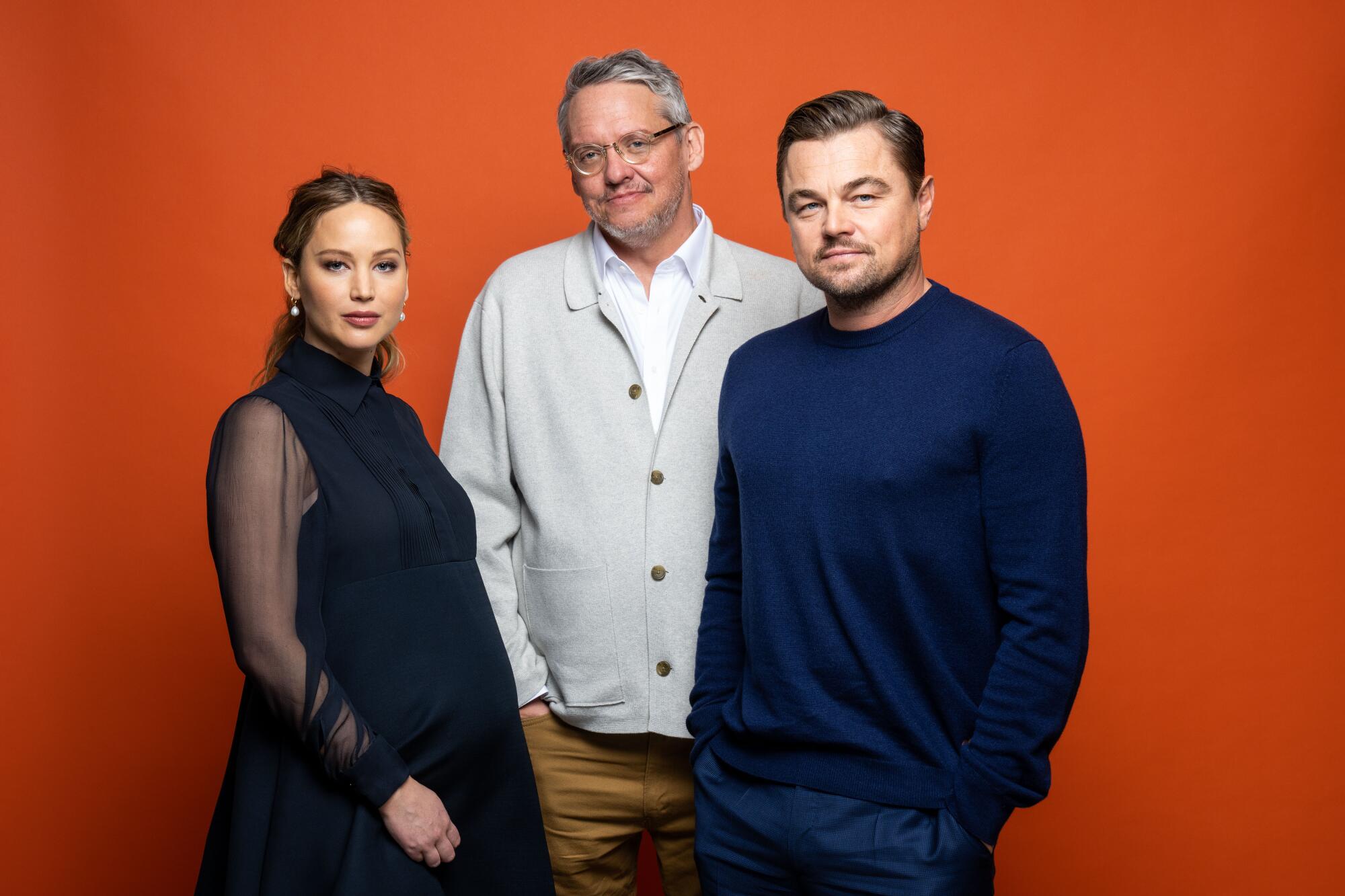
It’s the end of the world as we know it, and on a recent afternoon, Jennifer Lawrence, Leonardo DiCaprio and director Adam McKay are feeling fine.
Speaking with The Times over Zoom from New York, where they were promoting the star-studded end-of-the-world dark comedy “Don’t Look Up,” the three were in good cheer as they contemplated the potential future extinction of life on Earth. Such is the cognitive dissonance of these times — and of “Don’t Look Up.”
Currently playing in theaters and set to hit Netflix on Dec. 24, “Don’t Look Up” stars Lawrence and DiCaprio — along with a panoply of stars, including Meryl Streep, Jonah Hill, Cate Blanchett and Tyler Perry — as a pair of obscure astronomers who discover that a comet is on track to destroy the Earth in just six months. Overwhelmed by the enormity of what they’ve learned, the two set out to warn a world that really isn’t equipped to handle such bad news.
Using the familiar cinematic premise of an impending asteroid impact as a stand-in for the threat of climate change, McKay combines the stinging satire of his 2018 film “Vice,” which earned him Oscar nods for best picture, screenplay and director, with the gleeful absurdism of his early comedies like “Anchorman,” lampooning politics, social media, cable news, Big Tech and Hollywood.
For the cast and crew of “Don’t Look Up,” the experience of making a comedy about the end of the world just as the world actually seemed to be coming apart at the seams was head-spinning.
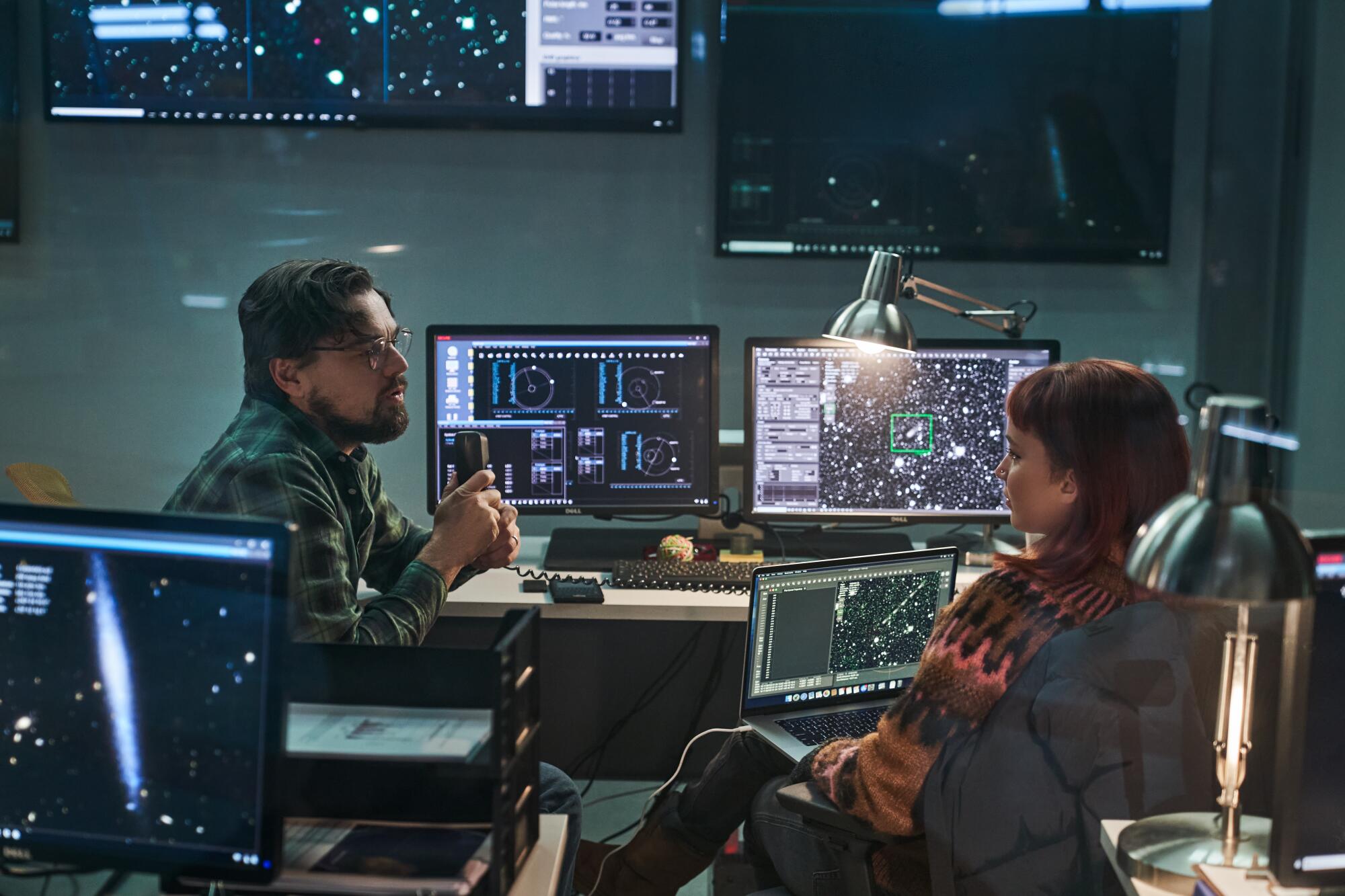
“As ridiculous as a lot of this stuff seemed, we were seeing a lot of this play out in real time,” DiCaprio said. “As COVID was hitting, as the Capitol was being stormed, our art was imitating real life.”
The Times spoke with McKay, DiCaprio and Lawrence about turning climate change, toxic political polarization and anti-science conspiracy theories into fodder for comedy — and, they hope, a bracing wake-up call for audiences to look up before it’s too late.
Adam, what made a comet feel like a good metaphor for the existential threat you wanted to explore in this movie?
McKay: I’d been trying to find a way to crack the story of the climate crisis and I’d written a bunch of different treatments. Some were “Twilight Zone”-type thrillers, some were character pieces. But none of them felt like they fully landed with that big open door you need for an idea like this.
I was talking to a friend of mine — journalist David Sirota, who is also a speechwriter for Bernie Sanders — about how tepid and anemic a lot of the mainstream media’s coverage of the climate crisis is. He said, “Yeah, it’s like an asteroid is going to hit Earth and no one cares.”
What I loved about the idea was that it’s a reference to a lot of narratives that we already know; we’re very comfortable with end-of-the-world movies and how they always wrap up in a nifty bow. But most of all, it made me laugh. It’s sort of a Clark Kent-level disguised allegory for the climate crisis. Right away, I thought, “Wow, that could be funny and disturbing” — which is kind of how I feel about the climate crisis. It’s absolutely ridiculous that we don’t address it to a degree where it’s almost funny and at the same time wildly upsetting.
Jen and Leo, what appealed to you about the idea?
Lawrence: I’m sure I can say this on behalf of pretty much everybody: It’s extremely frustrating to be a citizen that believes in climate change and is scared, but I’m not a part of it — you know, I can’t buy a senator — so we’re just kind of helpless. And finally, this came along and it was just funny and urgent. And I’ve wanted to work with Adam for as long as I can remember. So it was extremely exciting to sign on to it.
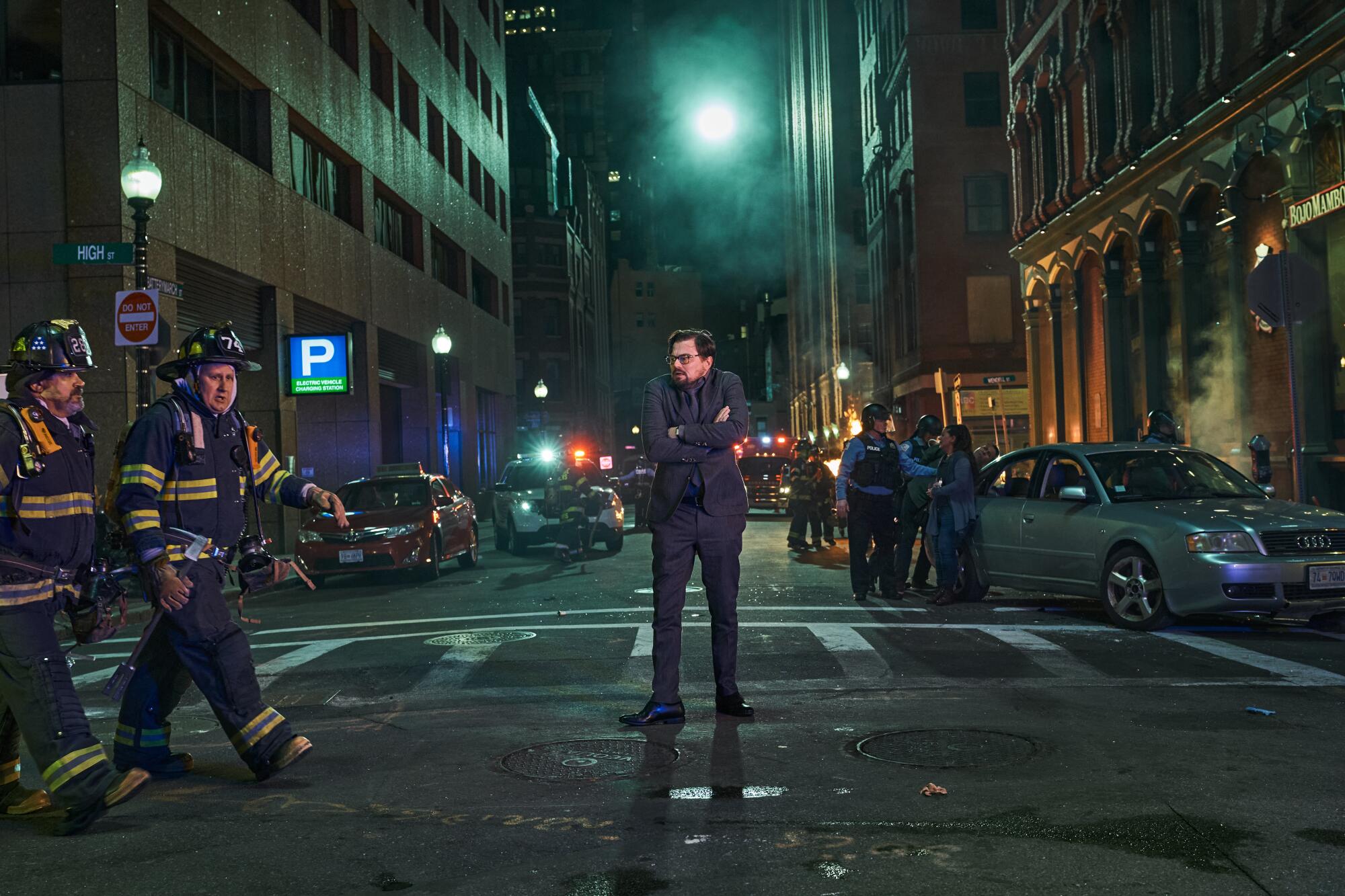
DiCaprio: I’ve been looking for a film about the climate crisis for decades now but none of them, from a narrative perspective, could create that sense of urgency. As many documentaries as I had done trying to explain the science of climate change, there is a level of inaction; people feel it’s too big of an issue for them to take on.
That’s where I really feel like Adam cracked the code, making it a dark comedy like “Dr. Strangelove” or “Network.” The movie was really an exercise in looking at how we as a species deal with bad news: how it becomes politicized, how we become distracted by social media alternative facts, how people who devote their lives to speaking the truth, whether it be COVID or the climate crisis, are marginalized.
It’s one of those films that comes maybe once in a generation that really just hits upon everything that we’re going through at a turning point in society and in this world, and I just knew I had to be a part of it.
The cast is so packed wall-to-wall with big stars, it’s almost like one of those 1970s disaster movies like “The Towering Inferno” or “The Poseidon Adventure.” Adam, were you envisioning that kind of all-star cast from the start?
McKay: No. I wrote the role of Kate Dibiasky for Ms. Lawrence here, and I wrote Teddy Oglethorpe for Rob Morgan, who I’d worked with on our [upcoming] HBO Lakers show. Then, like every delusional director on planet Earth, when you write a character like President Orlean, you think, “Let’s go to Meryl Streep” — and lo and behold, she said yes. Then Cate Blanchett and Tyler Perry came on board.
You don’t want to overload movies with too many recognizable actors. But my casting director, Francine Maisler, brought up a great point, which is that this movie is about distractions, celebrity culture, clicks, bells and whistles. I realized, “Oh, it’s kind of perfect. The recipe we were cooking up was like ‘It’s a Mad, Mad, Mad, Mad World’ with a little dash of Lars von Trier.”
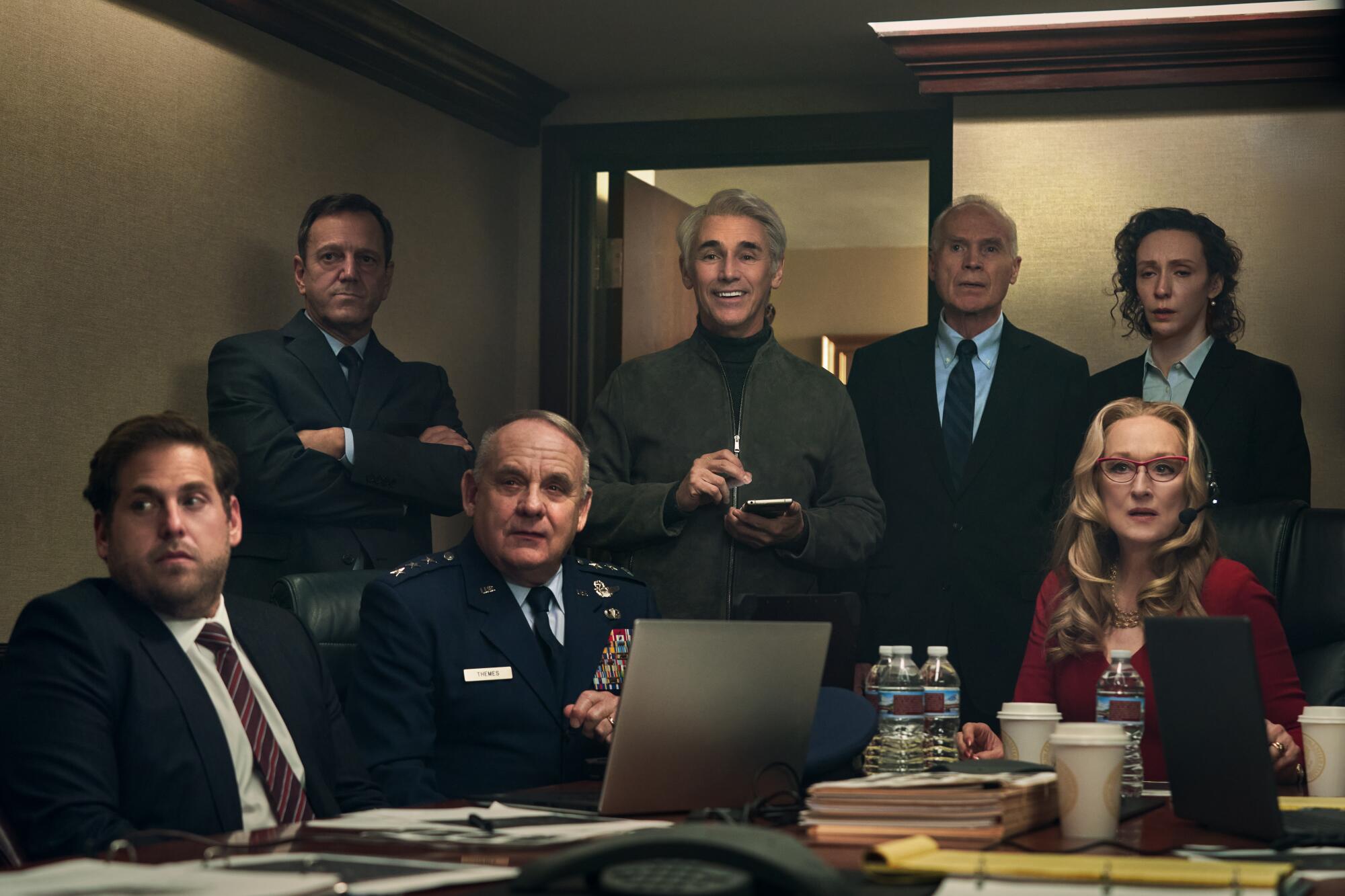
The movie tries to have fun with things that, at their root, are actually horrifying. How did you navigate the tone?
McKay: Each of these guys had their own responsibility for the tone. Kate Dibiasky was going to be the unerring truth — she’s the root note of the movie, the one who never bends. And Leo’s character, Dr. Mindy, was going to be more the incrementalist, the neoliberal who was going to try and stay in the room. So each of these guys were harmonizing, and we were just hoping and praying that when we got into that edit room, all these ingredients would come together.
DiCaprio: The end of this movie gets really dark, and had it not had that tonal shift, I don’t think we would have been as excited as we were to do it. You can never tell what a movie is going to do culturally, but the end of this film is really a smack in the face.
Lawrence: You called it an alarm clock. I liked that.
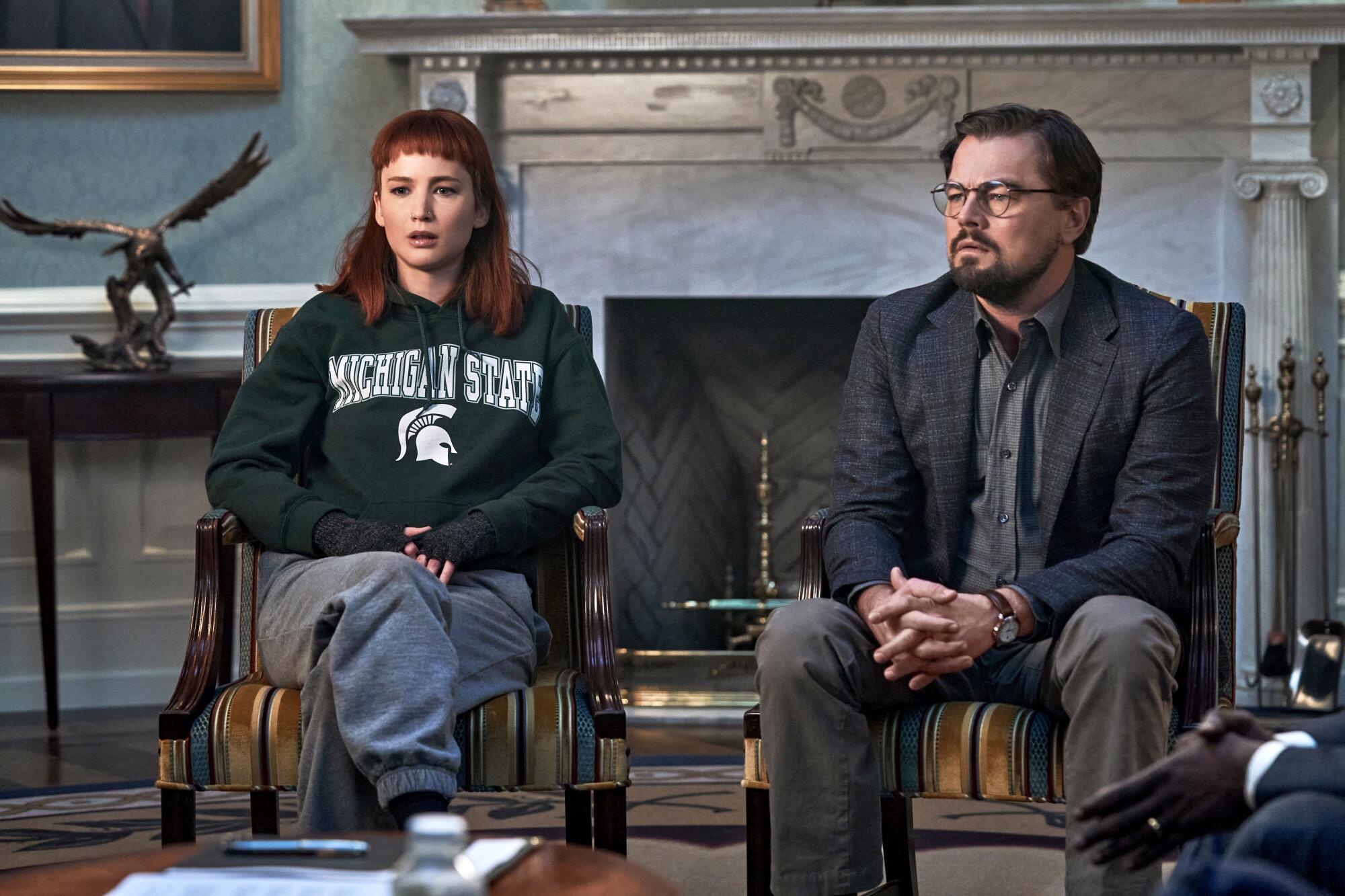
McKay: We’ve seen hundreds of movies where the world is about to end, whether it’s Marvel movies or James Bond or the ’70s disaster movies, and it always works out. I think it’s not crazy to say that maybe that’s part of the reason we’re not taking the collapse of the livable atmosphere seriously. Elon Musk was asked about climate change and basically said, “I know that technology will take care of it.” That sounds like someone who’s seen a lot of movies where you know that in the third act it’s going to work out.
Jen and Leo, what was it like shooting the scenes in the Oval Office with Meryl as the president and Jonah Hill as her chief-of-staff son, where they’re not taking your characters’ warnings of impending doom seriously? Was there much improvising?
DiCaprio: There was really no rehearsal process because of COVID, so to watch the relationship between Meryl and Jonah’s characters develop in front of us was kind of amazing to witness. This sexual tension starts, they’re laughing at people that are suffering, their arrogance, the flippant attitude about the science that we’re trying to portray — all of it was happening right before our very eyes.
Lawrence: When I first read the script, those scenes were the scariest part to me, because that is exactly how it would play out. Then when you hire the greatest actress on the planet to play the president, it only gets more believable and surreal. And Jonah is just a comedic master.
It was amazing to watch this thing that was really frightening and funny on the page be brought to life by the greats. And yeah, there was some improv. There was an entire day of Jonah insulting my character, which was really awesome. And then there was a moment that didn’t make it into the movie where Meryl called me a c—. I’ll just carry that in my heart forever.
McKay: Meryl actually said, “I signed this book to you, Kate, but I did it with a C.” Then she took a beat and said, “Because that’s what you are.” Then Jen came out in the hallway and was like, “The president of the United States just called me a c—.” It was pretty magical.
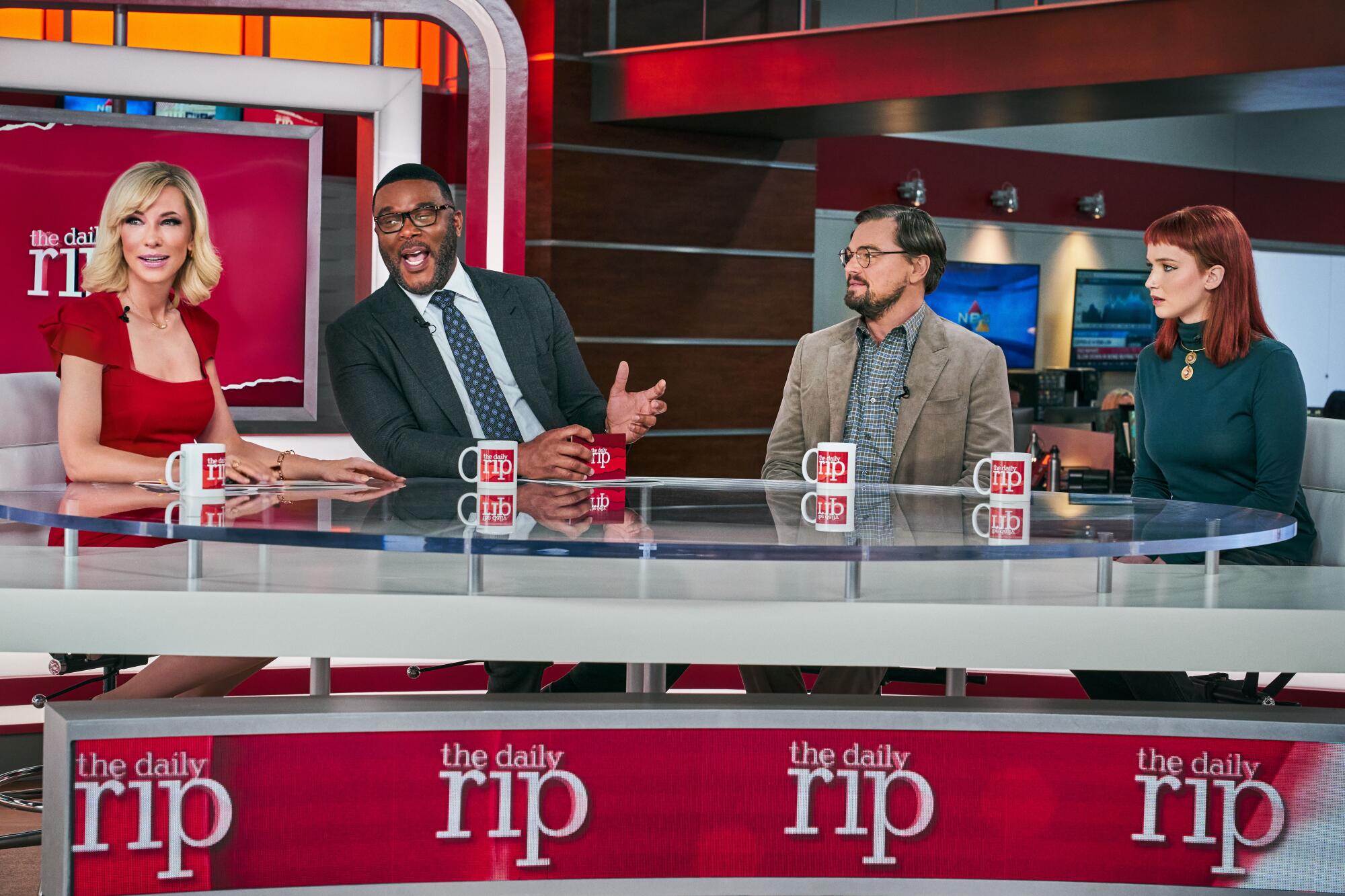
Lawrence: And it just came straight from her heart. It was not written that way.
In doing this movie, did you actually confront the question of what you would really do if you knew the world would end in six months?
DiCaprio: Well, that’s what I loved about the ending, because I felt like that’s ultimately how I would respond. We’re a communal species, and I would want to be around people I love and ignore the impending Armageddon. That dinner table scene is really what clinched it for me.
Lawrence: Adam and I would both chain smoke.
McKay: I would immediately get like a 2,200-calorie cheese steak with cheese fries and a cherry Wishniak. Then after that, I would start crying a lot, reestablishing faith, and then eventually, I would wind myself back to the ending of our movie: get with my loved ones and friends, put a big table in our backyard and just hold hands and pray and laugh.
More to Read
Only good movies
Get the Indie Focus newsletter, Mark Olsen's weekly guide to the world of cinema.
You may occasionally receive promotional content from the Los Angeles Times.











